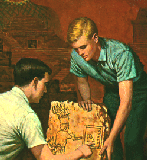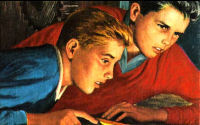

Popularity
The Mystery of the Immortal Detectives
Note: I wrote this essay in February 2002 as an assignment for a first-year university English course.
This year, Frank and Joe Hardy turn 75. The brothers from Bayport, USA (who may very well be the world's oldest teenagers!) have built up an impressive record: since 1927, they have solved hundreds of puzzling cases and brought thousands of nefarious criminals to justice. They have traveled around the world, from Iceland to the Caribbean, and they have worked with the FBI, the CIA, and Scotland Yard. They've even joined forces with fellow teen icon Nancy Drew. Over the generations, Frank and Joe's adventures have thrilled millions of young boys, and they still do -- Simon & Schuster publishes a new Hardy Boys book every second month. In this age of Playstation and Pokemon, when heroes spring not from books but from television screens, why do boys still want to read about the adventures of a couple of red-blooded young men who rely on their wits and their brawn? Why have the Hardy Boys endured?

Frank and Joe examine
an Aztec tablet
(from volume 43)
Frank and Joe Hardy were created by Edward Stratemeyer, the founder of an influential book mill that churned out hundreds of juvenile series books, including the Hardy Boys, Nancy Drew, Tom Swift, and the Bobbsey Twins. Stratemeyer knew what boys liked. He instructed his ghost-writers to produce rollicking tales, jam-packed with the things that appealed to boys the most: adventure, intrigue, and humor.
Even though the books are called mystery stories, the primary ingredient in the Hardy recipe is adventure. Frank and Joe have a knack for stumbling into one hair-raising situation after another. On Barmet Bay, an unexpected fog rolls in and the boys are nearly hit by a tugboat. In the North Woods, they encounter bear traps, crackling branches, and a snarling wolf named Saber. Offshore caves are an endless source of adventure -- volume seven is titled The Secret of the Caves, and as Frank and Joe have learned, most caves do have secrets. The subterranean caverns off Bayport have been used by smugglers, saboteurs, and kidnappers, and at one point, they even housed a foreign spy center, complete with radio equipment and submarines.
As if the non-stop adventure wasn't enough to keep boys breathless, Stratemeyer added to the recipe a healthy dose of mystery and intrigue. Frank and Joe live in a world of aliases and disguises. They often assume false identities, becoming "Fred and Jim" or "Frank and Joe Karlsen" at whim, and they barely even blink when their detective father, Fenton Hardy, emerges from his study dressed like a plumber or a sailor. The boys are routinely tailed by thugs in car, boat, or plane, and their mother has been frightened many times by shady strangers watching the house from behind a tree across the road. (It's a wonder the Hardys didn't have that pesky tree cut down!) Frank and Joe puzzle over secret messages, such as the coded plea for help that a young college professor left behind in his final exam, and they eagerly probe paneled rooms in search of the inevitable hidden doorway. The daring young detectives don't shy away from villains, even those with ominous foreign accents or evil-sounding names like Crowfeet, Jezro, Anchor Pete, or Chameleon. Frank and Joe relish a good mystery, and in Bayport, there are enough good mysteries to keep even Sherlock Holmes busy.
But lest these elements of adventure and intrigue become too overwhelming, the first Hardy Boys ghost-writer, Leslie McFarlane, made sure to infuse the books with plenty of humor. Chet Morton, Frank and Joe's best friend, can always be counted on for a laugh. Chet, the stereotypical fat boy, is ridiculed for his appetite, his clumsiness, and his cowardice. Chet's ever-changing hobbies have been a running joke in the series: in every volume, he gains a new interest, ranging from ventriloquism to fly-tying to spelunking. Another source of humor is Aunt Gertrude, Fenton Hardy's spinster sister. Aunt Gerturde, invariably described as "peppery," can always be counted on for a colorful remark. Some of her favourites included "The scoundrels!", "I won't have you boys off gallivanting around the countryside!", and "It's a wonder those cutthroats didn't murder us in our own beds!" Humor such as this gives readers a much-needed breather from the books' breakneck pace.
Stratemeyer's book mill was also known for its familiar, formulaic writing. The Hardy Boys books are written in a nearly invisible style, with concrete description, emotionless characters, and cliched dialogue markers like "Joe said excitedly" and "Frank declared angrily." Because Stratemeyer required each of the twenty chapters to end with a cliffhanger, the plot is forced into a hyperactive series of climaxes.

Frank and Joe
playing guitar
(from volume 22)
A Hardy Boys storyline usually follows a predictable pattern. First, Frank and Joe stumble across a clue that, coincidentally, happens to be relevant to a case their father is working on. Through a series of coincidences and dumb luck (and often, several overseas trips), they manage to trail the villains to their hideout, only to be captured before they can send for help. The ringleader, always an egomaniac, taks the time to gleefully explain his entire scheme to the Hardys, helpfully tying up any of the plot's loose ends. Of course, just as the villains have left Frank and Joe for dead, the boys escape, and the police move in to bring the criminals to justice. In the brief denouement, Frank and Joe celebrate their success at a gathering of friends and family. There are accolades all around, the boys receive a handsome reward, and everyone feasts on a delicious meal prepared by Aunt Gerturde. The book ends with a brief (and sometimes awkward) reference to the next title in the series.
Although the invisible style and formulaic storylines Stratemeyer established would never win him a Pulitzer prize, they do win his books plenty of fans. The unassuming writing places no demands on the reader, and after all, a twelve-year-old boy is not looking for demanding reading. The cookie-cutter plots are familiar and reassuring; when a young boy picks up a Hardy Boys book, he knows what he's in for. The books are like familiar old friends: interesting and enjoyable, but not always surprising or challenging. To a young reader who's just making the transition from storybooks to novels, these qualities are important.
But even these qualities can't completely solve the mystery of the immortal detectives. To some extent, Stratemeyer's potent recipe of adventure, intrigue, and humour explains the books' appeal, and his formulaic writing explains their popularity, but what explains their longevity? Why have the Hardy Boys endured? To find the answer, we must look a little deeper -- not into the pages of the books, but into the hearts of the boys who read them.
To a young boy, Frank and Joe Hardy are ordinary enough to identify with. Like all boys, they go to the soda shop with friends and they chafe under parental restrictions. Frank and Joe do the same things normal boys do, but unlike normal boys, Frank and Joe always excel. At track meets, they win gold medals and set records. In school, they're at the top of their class. At home, they have healthy, rewarding relationships with their parents. Who could blame a young boy, a boy who is struggling with insecurities about school, about girls, and about himself, for wanting to escape into the pages of a book and follow along with the adventures of two boys -- boys just like himself! -- in a world where truth is always rewarded, where good always triumphs, and where evil is always punished? Young boys need to escape from the pressures that, at this formative time in their lives, can be unbearable. The Hardy Boys books provide an avenue for this escape, and for this reason, Frank and Joe Hardy have lived a long and healthy life. The 75-year-old teenagers need not worry about retirement yet, for as long as there are mysteries in Bayport and young boys who want to read about them, the Hardy Boys will thrive.
